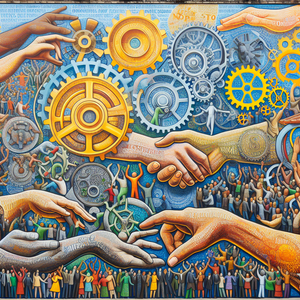Branding Gold: The Evolution of the Trump Name

Donald Trump’s rise to prominence began with his work in real estate, particularly through the Trump Organization. His audacious projects, including the renovation of the iconic Wollman Rink in Central Park and the development of Trump Tower, set the stage for his brand to become synonymous with luxury and success. However, it was not just the properties themselves that built his brand; it was the marketing strategies employed. Trump understood early on the importance of personal branding, attaching his name to his ventures to create an immediate association with quality and prestige. In the early years, Trump’s approach to real estate was bold and unorthodox. He often took risks that others would shy away from, such as investing in properties in New York City that were considered undesirable at the time. His ability to turn these properties into lucrative ventures established a foundation for his brand. By showcasing his projects in high-profile media appearances and interviews, Trump effectively created a brand narrative that positioned him as a savvy businessman and a symbol of the American Dream.
Brand Diversification
As the Trump brand gained traction, it expanded into various sectors beyond real estate. Trump-branded products, ranging from clothing lines to home goods, flooded the market. Some notable examples include Trump Steaks, Trump Vodka, and Trump University. Each of these ventures attempted to capitalize on the allure of the Trump name, promising luxury and success. While many of these products found limited success, they contributed to the overall brand identity that Trump cultivated: one of opulence, power, and exclusivity. One of the most significant moments in the evolution of the Trump brand came with the launch of the reality TV show "The Apprentice" in 2004. The program not only showcased Trump as a business mogul but also solidified his status as a household name. The show's catchphrase, “You’re fired,” became part of popular culture, and Trump's persona as a tough, no-nonsense executive resonated with audiences. This visibility allowed him to further diversify his brand, leading to endorsements, speaking engagements, and increased media presence. Trump's foray into entertainment demonstrated his understanding of the emerging media landscape and the power of television as a branding tool. By aligning his personal brand with a successful TV show, he reached millions of viewers, many of whom would associate his name with success and authority in business. This strategic move not only increased his fame but also opened new avenues for brand expansion.
Challenges and Controversies
Despite its successes, the Trump brand has not been without its challenges. The controversies surrounding Trump’s political career, personal conduct, and various business dealings have raised questions about the sustainability of his brand. For instance, the bankruptcy of several Trump-branded hotels and casinos in the 1990s cast a shadow over his entrepreneurial prowess. Additionally, the backlash against Trump-branded products, particularly during and after the 2016 presidential election, led to calls for boycotts and a decline in sales for some lines. Moreover, the use of the Trump name has been challenged legally and ethically, as seen in the case of Trump University, which faced multiple lawsuits and was eventually shut down due to allegations of fraud. These instances highlight the fragility of a brand built on an individual’s persona, where public perception can drastically shift based on current events and actions. The 2016 election marked a pivotal moment for the Trump brand, as it became increasingly intertwined with political identity. The divisive nature of his candidacy and presidency polarized public opinion, leading to intense scrutiny of his business practices and personal life. This scrutiny not only affected his approval ratings but also had a direct impact on the performance of his brand in the market.
Resilience and Adaptation
Despite the controversies, the Trump brand has demonstrated resilience. Through strategic public relations and a loyal base of supporters, Trump has managed to maintain brand recognition and relevance. His ability to adapt to changing circumstances—whether pivoting to social media or engaging with audiences through rallies—has kept the Trump name in the spotlight. Furthermore, Trump’s ventures into real estate development have continued, with new projects popping up and existing properties being rebranded. The recent acquisition of golf courses and resorts, as well as his involvement in the hospitality industry, reflects a continued commitment to leveraging his brand in a variety of markets. Trump’s approach to brand management has also included a focus on his core supporters, often utilizing social media platforms to communicate directly with them. This strategy has allowed him to cultivate a sense of community and loyalty, reinforcing the notion that the Trump brand is not just a product but a movement.
The evolution of the Trump brand is a compelling case study in modern branding and the complexities of public perception. From its origins in real estate to its expansion into diverse sectors, the Trump name has become a symbol of both success and controversy. While the brand has faced significant challenges, its resilience speaks to the power of personal branding in an increasingly competitive landscape. As we continue to observe the evolution of the Trump brand, it serves as a reminder of the intricate relationship between identity, perception, and business in today’s world. The journey of the Trump name underscores the importance of adaptability in branding, illustrating how a brand can thrive amidst adversity and change.
Brand Manager
Procter & Gamble, Unilever, Coca-Cola
Core Responsibilities
Develop and execute brand strategies to enhance brand equity and market presence.
Conduct market research to identify consumer trends and insights that inform branding decisions.
Collaborate with cross-functional teams to ensure consistent brand messaging across all platforms.
Required Skills
Strong analytical skills, with experience in market analysis and consumer behavior.
Proficiency in digital marketing tools and social media platforms.
Excellent communication and project management skills.
Public Relations Specialist
Edelman, Weber Shandwick, FleishmanHillard
Core Responsibilities
Craft and disseminate press releases, media kits, and other communications to promote brand image.
Build and maintain relationships with media representatives and influencers.
Monitor media coverage and public perception, providing strategic recommendations for brand positioning.
Required Skills
Exceptional writing and verbal communication skills.
Experience with crisis management and handling media inquiries.
Familiarity with social media monitoring tools and analytics.
Digital Marketing Strategist
HubSpot, Adobe, Salesforce
Core Responsibilities
Design and implement comprehensive digital marketing campaigns to drive online engagement and sales.
Analyze performance metrics to assess campaign effectiveness and optimize strategies accordingly.
Stay updated on emerging digital marketing trends and tools to enhance brand visibility.
Required Skills
Proficient in SEO, SEM, and content marketing strategies.
Strong analytical skills with experience in Google Analytics and social media insights.
Creativity in developing digital content that resonates with target audiences.
Market Research Analyst
Nielsen, Gartner, Ipsos
Core Responsibilities
Gather and analyze data on consumer preferences, market trends, and competitive landscape.
Prepare reports and presentations to communicate findings and recommendations to stakeholders.
Collaborate with marketing teams to develop targeted strategies based on research insights.
Required Skills
Expertise in statistical analysis and research methodologies.
Proficiency with data analysis software (e.g., SPSS, Tableau).
Strong attention to detail and critical thinking abilities.
Social Media Manager
BuzzFeed, Hootsuite, Buffer
Core Responsibilities
Develop and execute social media strategies to enhance brand awareness and engagement.
Create and curate content tailored to specific platforms and target audiences.
Monitor social media trends and user interactions, responding to comments and messages to foster community engagement.
Required Skills
Excellent writing skills with a knack for storytelling through social media.
Familiarity with social media analytics tools and a strong understanding of algorithms.
Creative thinking to generate innovative content ideas and campaigns.


